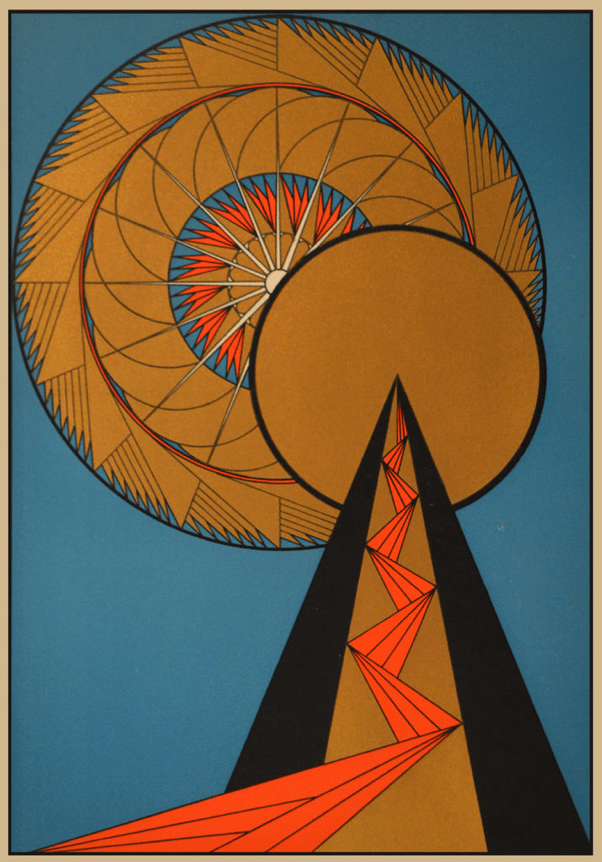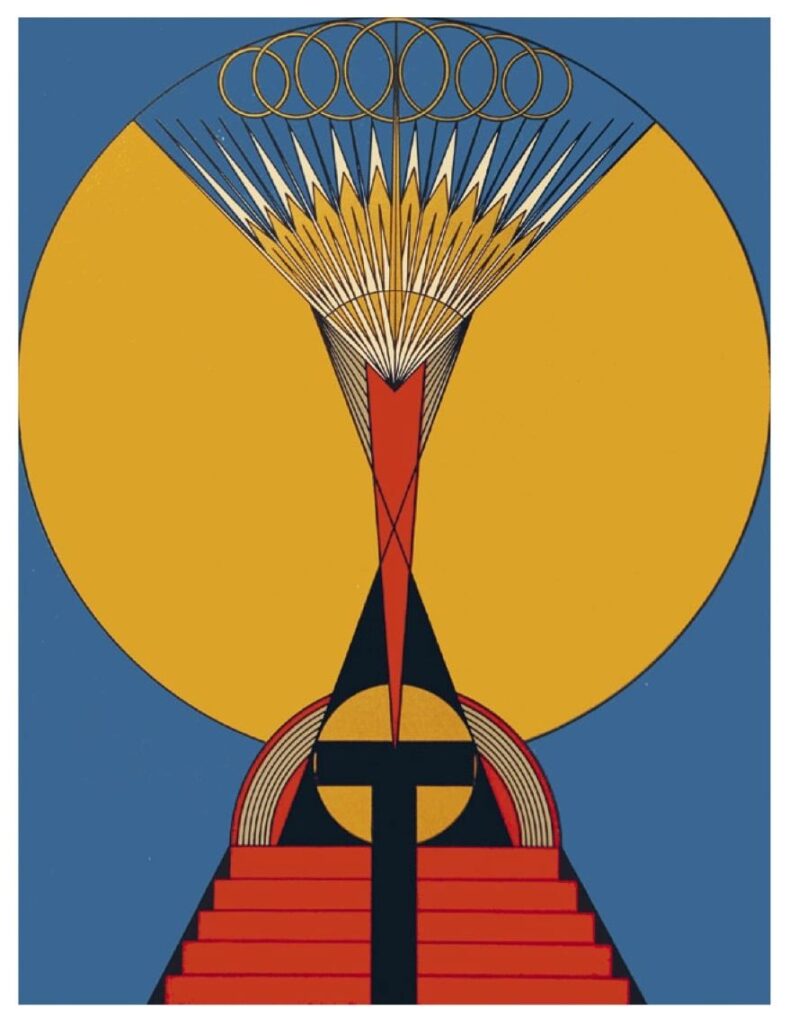Eventi
Olga Fröbe-Kapteyn – Conoscenza profonda

Care amiche e cari amici della Fondazione Eranos,
siamo lieti di informarvi della prestigiosa esposizione “Olga Fröbe-Kapteyn. Tiefes Wissen” [“Olga Fröbe-Kapteyn. Conoscenza profonda”], curata da Yasmin Afshar presso la Kunsthalle Mainz, Magonza (Germania), 30 giugno-17 settembre 2023.
Si tratta della prima esposizione monografica dedicata alle opere pittoriche di Olga Fröbe-Kapteyn (1881-1962), la fondatrice di Eranos.
La mostra, che include anche opere di alcune fra le più importanti artiste della scena contemporanea chiamate a dialogare idealmente con lei, segue le precedenti esposizioni collettive promosse dalla Fondazione Trussardi a Palazzo Reale, Milano, nel 2015, dal New Museum a New York nel 2016, dal Centre Pompidou a Parigi nel 2021 e dal Guggenheim Museum a Bilbao nel 2021-2022, documentate nei rispettivi Cataloghi.

Dal 30 giugno al 17 settembre 2023, il Museo d’arte moderna della città renana di Magonza dedica i suoi meravigliosi spazi espositivi, a una mostra interamente dedicata per la prima volta ai vari periodi della produzione pittorica della nostra fondatrice, Olga Fröbe-Kapteyn, oggetto di sempre maggiore interesse sia da parte del mondo dell’arte sia della ricerca scientifica.
Viviamo un’epoca in cui si stanno definendo nuove direzioni. Questo ripensamento comporta anche un modo diverso di guardare al passato. Nell’arte, per esempio, stanno lentamente venendo alla luce opere di artisti precedentemente emarginati a causa del loro contesto socio-culturale, del loro genere o della loro etnia.
Olga Fröbe-Kapteyn, nata nel 1881 a Londra e morta nel 1962 ad Ascona, è proprio una di queste personalità. La sua vita di donna, ricercatrice e artista è affascinante. Il suo lavoro pittorico, dalle potenti “tavole di meditazione” geometriche e astratte alle “visioni” interiori dipinte su carta, debitrici queste ultime anche del suo scambio creativo e intellettuale con lo psicologo Carl Gustav Jung, fanno parte di una pratica che abbraccia varie direzioni.
Olga Fröbe-Kapteyn creò anche una vasta collezione di cosiddetti archetipi (forme universali dell’immaginazione umana) e diede vita ai Convegni di Eranos, i celebri simposi internazionali che si tengono tutt’oggi ad Ascona. Tutte le sue attività erano espressione dello sforzo di armonizzare conoscenze esoteriche, umanistiche e scientifiche, in un percorso unico.
La mostra alla Kunsthalle di Magonza illustra l’opera di Olga Fröbe-Kapteyn secondo una prospettiva attuale. La mostra, costruita come un dialogo tra presente e passato, rivela la forza degli interrogativi sollevati da Olga Fröbe-Kapteyn, nel loro tentativo di esplorare modelli alternativi di produzione della conoscenza, trascendendo i confini di culture, discipline e periodi storici.

Olga Fröbe-Kapteyn, The Central Spiritual Sun, tecnica mista su carta, c. 1926-1934
(© Fondazione Eranos, Ascona)
Wir leben in einer Zeit, in der sich viele Weichen neu stellen: Denker*innen, Aktivist*innen, Kunstschaffende und Forscher*innen hinterfragen Dogmen und produzieren neues Wissen – Wissen, das die Grenzen akademischer Disziplinen und westlicher Erkenntnislehren anerkennt; Wissen, das sich an ganzheitlichen Weltanschauungen oder Wissenssystemen verschiedener Kulturen orientiert. Zentral ist dabei auch der Blick in die Geschichte, um darin freizulegen, was vergessen, übergangen oder ausgelöscht wurde. In der Kunst entdecken wir Positionen, die aufgrund ihres soziokulturellen Kontexts, ihres Geschlechts oder ihrer Ethnie lange ausgegrenzt wurden. Als Aussenseiter*innenkunst, Kunsthandwerk, rituelle Artefakte oder Forschungspraxis fanden sie keinen Platz im allgemeinen Kunstdiskurs.
Olga Fröbe-Kapteyn (geb. 1881, London, Großbritannien; gest. 1962, Ascona, Schweiz) ist eine solche Figur. Ihr Leben als Frau, Forscherin, Mystikerin und Künstlerin ist faszinierend. In den kulturell und politisch widrigen Jahren vor dem zweiten Weltkrieg setzte sie sich mit Theosophie und ostasiatischer Philosophie auseinander, legte ein riesiges Bildarchiv an und förderte den Austausch zwischen verschiedenen Disziplinen, viele Jahrzehnte bevor überall von Transdisziplinarität die Rede ist. Ihr bildnerisches Werk, die geometrischkraftvollen Meditationstafeln und die später auf Papier entstandenen sogenannten Visionen, die auf ihrem Austausch mit dem Psychologen Carl Gustav Jung beruhen, sind Teil ihrer umfassenden Praxis. Anhand eines vielgestaltigen Bildsystems suchte Fröbe-Kapteyn nach Antworten zur Weltordnung und zielte, ausgehend von der Vorstellung, dass Formen psychoaffektive Bedeutungen besitzen, auf Wirkungen und Effekte ab. „Die tiefsten Dinge im menschlichen Leben,“ soll sie gesagt haben, „sind nur bildhaft (…) auszudrücken.“
Fünf zeitgenössische Positionen schlagen in der Ausstellung die Brücke in die Gegenwart. Die Arbeiten von Monia Ben Hamouda, Kerstin Brätsch, Hylozoic/ Desires (Himali Singh Soin & David Soin Tappeser), Mountain River Jump! und Sriwhana Spong beschäftigen sich mit Gegenkonzepten zu rational, weiß, patriarchisch und kolonial geprägtem Wissen. Sie schaffen in ihren Arbeiten Räume und Erzählungen, in denen sie zu Begegnungen mit solch alternativen Formen von Wissen einladen – Wissen, das unterbewusst, körperlich, natürlich, spirituell, etc. ist, und Wissen, das meist nicht über Worte, Sprache und Konzepte produziert und weitergegeben wird. Rituelle Praktiken in Geschichte und Gegenwart sind dabei häufig Ausgangspunkt. Wie auch Fröbe-Kapteyn thematisieren sie Kunst als Werkzeug von Forschung, Heilung oder Kommunikation und nehmen dabei antikoloniale, machtkritische Positionen ein. Deutlich wird dabei, wie statt dem Prinzip von L’Art pour L’Art (Kunst-um-der-Kunst-Willen) das Wirken von Kunst (und von Bildern ganz allgemein) in den Vordergrund rückt.

Olga Fröbe-Kapteyn, The Light of the Soul, c. 1926–1934
(© Fondazione Eranos, Ascona)
We live in a time in which new directions are being defined: Thinkers, activists, art producers, and researchers are questioning given dogmas and generating new knowledge – knowledge that recognises the boundaries of academic disciplines and Western epistemologies; knowledge that is oriented towards holistic worldviews or knowledge systems of diverse cultures. What is also key is to cast a glance back in time and unearth what has been forgotten, overlooked, or erased from history. In the field of art we are discovering positions that, owing to their socio-cultural context, their gender, or their ethnicity, were excluded for a very long time. As outsider art, arts-&-crafts, ritual arte- facts, or research practices, they could find no place in the general art discourse.
Olga Fröbe-Kapteyn (born 1881, London, Great Britain; died 1962, Ascona, Switzerland) is precisely such a figure. Her life as a woman, a researcher, a mystic, and an artist is fascinating. In the culturally and politically difficult years prior to World War II, she immersed herself in theosophy and East Asian philosophy, assembled a huge image archive, and promoted interaction between different disciplines many years before the word transdisciplinary was on everyone’s lips. Her visual oeuvre, the powerful geometric Meditation Panels and the Visions, which draw from her discussions with psychologist Carl Gustav Jung, are part of her encompassing artistic practice. On the basis of a highly varied pictorial system, Fröbe-Kapteyn sought to find answers to the order of the world and, starting from the notion that forms do have psycho-affective meanings, endeavored to achieve specific effects.
“The most profound things in human life,” she is said to have commented, “can only … be expressed in images.”
In the exhibition, five contemporary artists and artist duos forge a link to the present day. The works by Monia Ben Hamouda, Kerstin Brätsch, Hylozoic/Desires (Himali Singh Soin & David Soin Tappeser), Mountain River Jump!, and Sriwhana Spong explore concepts that counter knowledge shaped by rationality, whiteness, the patriarchy, and colonialism. In their works they create spaces and narratives in which they invite us to encounter such alter- native forms of knowledge – knowledge that is subconscious, physical, natural, spiritual, etc. Knowledge that usually is not produced and conveyed using words, lan- guage, and concepts. The artists often take ritual practices in history and the present as their starting point. Like Fröbe-Kapteyn for her part, they underscore that art is a tool for research, healing, or communication, while in the process adopting anti-colonial positions critical of the power status quo. It becomes clear that instead of the principle of l’art pour l’art, the emphasis is on the impact that art (and with it images in general) can have.
https://eranosfoundation.org/project.php?proj=112
Contatti
Via Moscia 125 · C.P. 779 · 6612 Ascona (Svizzera) · Tel. +41 91 792 20 92
www.eranosfoundation.org – info@eranosfoundation.org
Facebook: Eranos Foundation
Sostenitori
Copyright © 2023 Eranos Foundation, Tutti i diritti riservati.
Ricevi questa mail in quanto sei iscritto alla nostra newsletter.
Il nostro indirizzo:
Eranos Foundation
Via Moscia 125
CP 779
Ascona 6612
Switzerland


